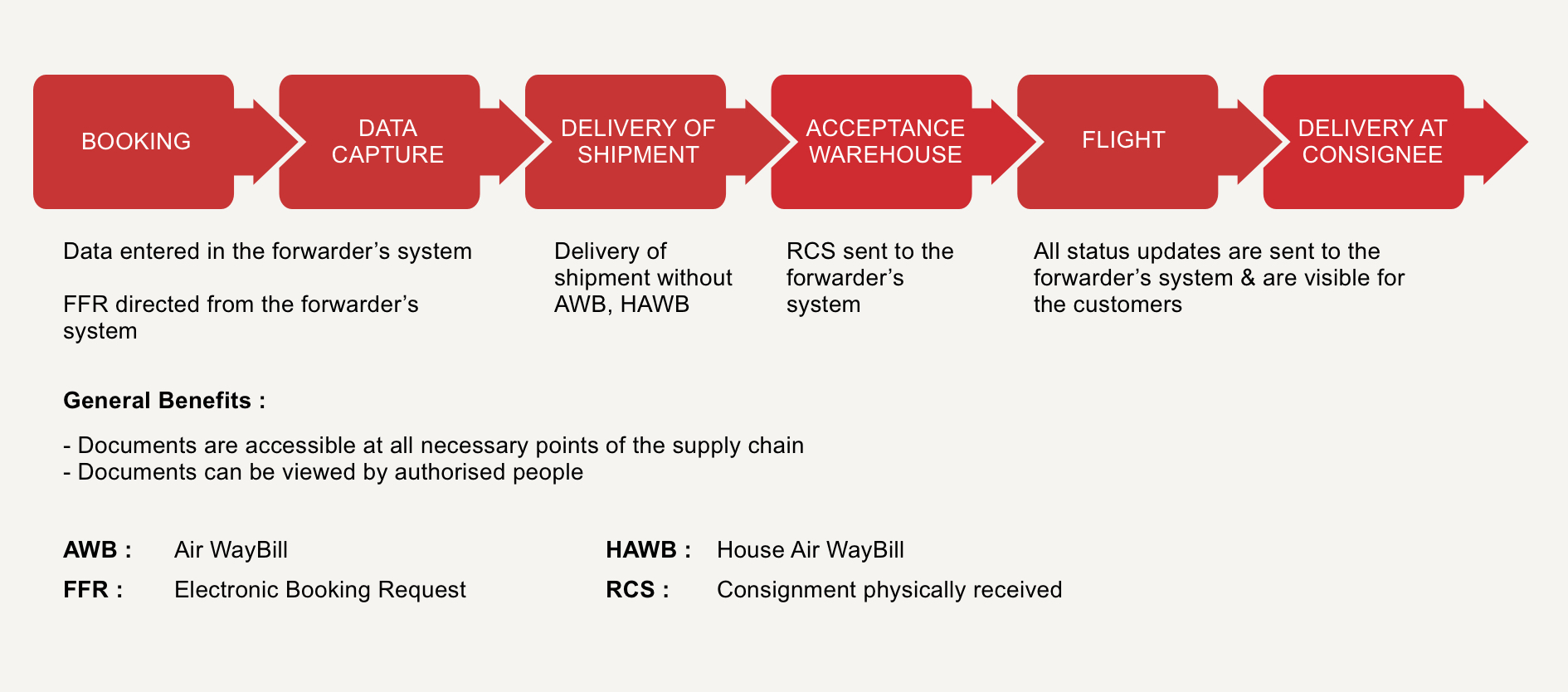FWB Penetration (2018)
eAWB Penetration (2018)
eBooking Penetration (2018)
eFreight
What is e-freight
As an IATA initiative, e-freight intends to eliminate the use of paper documents from the air cargo sector, and replace them with standardised electronic messages transmitted via regulated data exchange. Going paperless reduces complexity and increases efficiency and transparency, which benefits all the parties. e-freight is an industry-wide collaboration of carriers, forwarders, ground handlers, shippers, and customs authorities.
Our commitment
We are the leading carrier and driving force behind the adoption of e-freight in Switzerland. All our SWISS stations are e-freight capable.
Why use e-freight
 |
Efficient
|
 |
Fast
|
 |
Transparent
|
 |
Reliable
|
Ideal e-freight process

eAWB
What is eAWB
In today's electronic world, air cargo still relies heavily on paper documentation for the exchange of information. Each international air freight shipment can require more than 30 different paper documents.
The AWB (Air Waybill) is the most important transportation document in air cargo: With eAWB, the electronic version of the Air Waybill, the air cargo industry is taking a significant step towards eliminating the numerous paper documents required for transporting cargo and bringing accuracy, efficiency and confidentiality to the process.
Our commitment
As an industry pioneer, Swiss WorldCargo has been playing a leading role in the promotion of eAWB as the preferred means of shipping cargo. We were a key participant in the proof of concept activities for IATA’s Multilateral e-AWB agreement in Switzerland and, more recently, we have been playing a leading role in IATA’s eAWB 360, an industry call-to-action aiming at rolling out eAWB across airports globally using the Single Process service.

How to do eAWB in 4 simple steps
- Join the agreement
Join the IATA Multilateral eAWB agreement and request activation from Swiss WorldCargo. See Freight Forwarders on the IATA website for details.
- Transmit the AWB data
Transmit the air waybill data in the eAWB messaging format to Swiss WorldCargo before cargo acceptance at the terminal. Use IATA's EDI Cargo IMP (FWB-16 or higher) messages or the alternative channel on the www.swissworldcargo.com website.
- Identify the shipment type
Label the 'electronic' shipments with either EAP (eAWB shipment with accompanying documentation) or EAW (eAWB consignment without accompanying documentation) at the time of booking.
- Complete the process
Tender your shipments without the paper AWB. Where a paper AWB is required due to regulatory or operational reasons, Swiss WorldCargo will print the paper AWB for you based on the AWB data transmitted.
eCSD
What is e-CSD
Consignment Security Declaration (CSD) provides regulators with an audit trail of how, when, and who secured the cargo along the supply chain. e-CSD, the electronic form of CSD, enables the air freight industry to exchange and archive cargo-related security information in electronic mode. The CSD and e-CSD are the standardised forms of security declaration endorsed by the International Civil Aviation Organisation (ICAO).
Why use e-CSD
 |
Efficient
|
 |
Transparent
|
 |
Secure
|
Digitisation Reinventing the air cargo sector
Shipping goods by air still involves a lot of paperwork and manual processes. We believe digitisation is the only way to make air cargo efficient, secure and fast. As a founding member of Cargo iQ, Swiss WorldCargo is fully committed to the vision of improving the transportation process by adopting electronic and web based technologies. We are an active participant in IATA initiatives such as eCargo, Message Improvement (MIP), and Electronic Consignment Security Declaration (e-CSD). Read more about the programs and initiatives below.